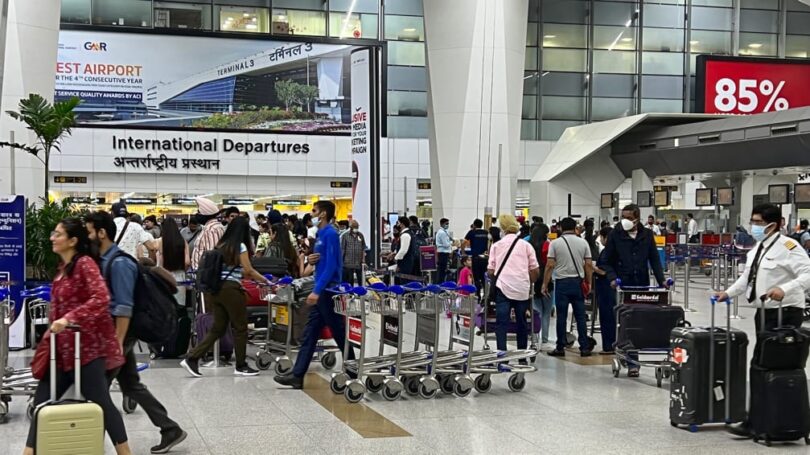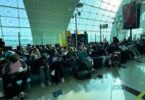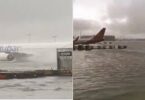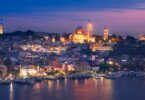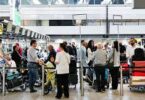(CNN): Chaitali Aggarwal had long dreamed of visiting New York from her home in the Indian capital, New Delhi. And so in 2020, she applied for a tourist visa for herself and her father.
Two years later, they’re still waiting.
Of course, as with all globetrotting, Covid-19 got in the way. But while travel has mostly resumed as the pandemic retreats, Aggarwal still has a bureaucratic mountain range standing in the way of her American dream.
She’s not the only one.
Many Indians hoping to head the US for vacations or to see family are now faced with huge delays in obtaining the interviews needed to be granted a visa. The issue is affecting would-be visitors from other countries too.
That means one of the biggest sources of tourism to the United States is being severely restricted, potentially losing the country millions of dollars of revenue.
“We will take any appointment, any time,” Aggarwal says. “But I don’t see it happening any time soon.”
Back in 2020, Aggarwal hired an agent to help navigate the complicated US tourist visa process. She secured visa interview appointments but these were put off because of the pandemic. Now, because of changed circumstances, she’s had to start the process again.
And, having already blown 14,000 rupees ($171) in fees and payments to the third-party agent, she has to decide whether she can afford to do it again.
To get a business or tourist visa, an Indian citizen must submit information about their visit’s purpose, proof that they can financially support themselves while in the US, work history and educational background, details about relatives who live in the US and a full itinerary.
The final stage of the visa process is an in-person interview — if you can get one.
According to the US State Department, the wait time in early December for one of these interviews at the American Embassy in New Delhi was 936 calendar days, including weekends and holidays. In Hyderabad, it was 780. In Mumbai, it’s 999.
A Department of State representative told CNN Travel that initiatives are in place to speed up visa interview processes, including on-boarding new employees and hiring “eligible family members of our diplomatic staff to fill consular positions overseas and in the United States.”
They acknowledged difficulties were still being experienced but said the department was also expanding its interview waiver process for some temporary workers, students and academic exchange visitors. They said global visa processing should reach or exceed pre-pandemic levels by 2023.
“While we have made great strides in recovering from pandemic-related closures and staffing challenges, we are still working to respond to the significant demand for visa services,” the representative added.
“We recognize some applicants may still face extended visa interview wait times. We are committed to reducing wait times as quickly as possible, recognizing the critical role international travel plays in the US economy and the importance of family reunification.”
Critics say that these measures aren’t enough. And it’s not only travelers like Aggarwal who feel the impact, but US businesses too.
The United States Travel Association, a tourism industry body, commissioned a study looking at three of the US’s biggest inbound travel markets — Brazil, India and Mexico — and the financial and reputational damage of losing their tourists.
USTA’s president and CEO, Geoff Freeman, says that potentially the most significant impact of these delays is that travelers may fall in love with another destination and decide the US isn’t worth it — ever.
“The visitor you deter today is also the visitor who chooses not to come tomorrow,” he says.
That means significant lost revenue. According to the National Travel and Tourism Office, part of the US Department of Commerce, India was the country’s 10th biggest tourism market in 2019 — but the fifth biggest spender.
The USTA study estimates the US is potentially missing out on $1.6 billion in tourism revenue from Indian tourists who opt to go elsewhere in 2023.
The situation is made more precarious because many insurers won’t cover travel disrupted by visa issues.
“It’s unlikely your travel insurance provider will cover your canceled trip if you didn’t receive your travel visa,” says Jeff Rolander, vice president of claims at Faye Travel Insurance.
“Unfortunately, even if it’s requested on time and delayed or simply not requested on time, this counts as a required document to enter your destination, making it impossible for a provider to protect you from cancellation costs if you didn’t have this upon your trip’s set departure date.”
USTA’s Freeman is doubtful things are going to change any time soon, despite official pledges.
“To date, we have not seen the desire at the State Department to get this issue addressed,” he said.
Aggarwal, who changed her original plans and visited Canada this summer, is trying to decide if she can financially or emotionally afford to restart her application for a US tourist visa.
She hasn’t quit fantasizing about visiting the Big Apple, though.
“I really do want to travel. New York is very high on my travel list. But the list is just so long.”

